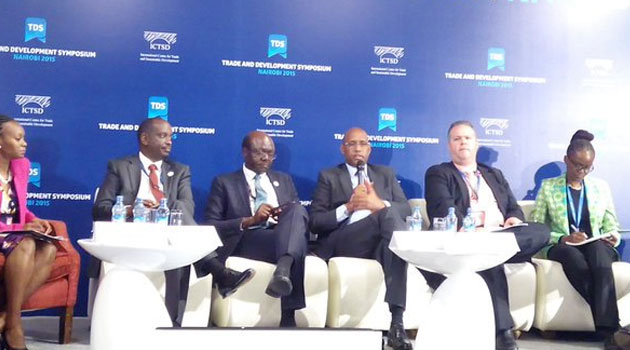
Mohamed said the trend has increased the cost of doing business and undermined the relative advantage of doing business in the region/CFM
With trade between East African Partner States standing at 12 percent, comparing lowly to intra-European Trade at 60 percent and Intra-Asia at 40 percent, he said domestic laws and regulations and imposed restrictions on free movement of goods and services has impeded accelerated growth.
Speaking at the Trade and Development Symposium on the sidelines of the WTO Ministerial Conference in Nairobi, Mohamed said the trend has increased the cost of doing business and undermined the relative advantage of doing business in the region affecting the business community trading across orders.
Citing the challenges around harmonization of internal and external tariffs, he said arbitrary protectionist measures have affected exemptions schemes such as duty remissions and stay of application despite their original intention to enable Partner States and manufacturer’s access raw materials and bridge shortage of essential items that are not available in the region.
“Often, these exemption schemes distort the implementation of the Customs Union. The conditions under which the schemes are implemented in effect causes restrictions in accessing the Community market on preferential terms even for products which are originating in the EAC Partner States according to the agreed originating criteria,” said Mohamed.
Further, he said the exemptions have given room for misinterpretation of the relevant ministerial directives by Partner States or customs officials on the conditions attached to the exemption schemes.
In the recent past, Kenyan companies exporting under the duty remission scheme have protested being subjected to paying full duty for imported input as opposed to the rules of origin scheme where tax is paid on imported raw materials, at least 35 per cent value addition.
Mohamed said the delays and commitment in harmonizing national laws to fit with the requirements of the EAC Common Market Protocol has been denying the bloc full integration.
Independent reports by East African Legislative Assembly (EALA) and World Bank, showed 63 non-conforming measures exist in trade in services, 51 non-tariff barriers affecting trade in goods while only two capital operations are free of restrictions in all partner states.
Mohamed said less over-dependence on commodities and focus on expanding infrastructure sector will help accelerate private sector participation and intra-EAC trade.
“Kenya’s planned investments in infrastructure estimated at Sh5.5 trillion ($55.6 billion) on telecommunications and power generation coupled with Mega infrastructure projects in East Africa are set to create unique opportunities and open new markets,” said Mohamed adding this will boost intra-EAC trade.
The Cabinet Secretary said the Kenya is reforming its policy space to ensure private participation in infrastructure development across the region.
“Policy changes on tendering processes to ensure transparency and local content policy to ensure high priority public-private partnership programs, will boost the prospects of domestic companies involved in regional infrastructure building,” said Mohamed.
He challenged the business community to see beyond business practices or prohibitions that protect their domestic industries from foreign competitions.
“The private sector should look at the low level of intra-EAC as an opportunity in itself in the lens of regional opportunities currently being occupied by products from outside the EAC region,” said Mohamed.
Despite challenges in the East African Common Market Protocol, EAC saw its growth in trade grow from Sh260 billion ($2.6 billion) in 2004 up to Sh860 billion ($8.6 billion) realized in 2014. Uganda, Kenya, Tanzania, Rwanda and Burundi make up the EAC.


































